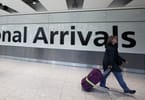Larry Kellner says he grudgingly approved first-bag fees, thinks airline re-regulation should be considered and is bracing for the possibility of more layoffs as a deepening recession crimps travel.
In a wide-ranging interview with the Houston Chronicle, the chairman and chief executive of Continental Airlines said there’s no indication the industry is close to pulling out of the doldrums.
“In employee meetings we talk about the fact that for the good of the organization, we need to keep our people working in line with the volume of work that we have,” said Kellner, whose company is one of Houston’s largest employers, with more than 18,000 workers locally last year. “It is very important how we manage that.”
However, he adds that “the business cycle is continuing to decline,” and made it clear that fewer passengers could mean fewer phone agents to take their calls, fewer catering workers to make meals and even fewer flight-related jobs to achieve “the right number of people” for business conditions.
Back then, Continental cut about 3,000 jobs, mostly through voluntary programs. Kellner said any decisions on more cuts will come as Continental gets closer to autumn, traditionally a time when traffic drops off after the summer vacation season.
“As painful as it is, we have got to make sure we keep our staffing in line with the flying we are doing. We have got to keep those in synch,” said Kellner, who has been at Continental for 14 years and ascended to the top spot after Gordon Bethune retired in 2004.
For now, Continental projects its flight capacity will be down 7 percent this year.
“We expect that to change and soon, as rapidly as the business environment has deteriorated,” Gimme Credit analyst Vicki Bryan wrote in a report.
Kellner said Continental is controlling labor costs for now by liberalizing time-off policies, an unusual move during the springtime as airlines gear up for the summer.
“We’ve got lot of people off now who are on company-offered leave of absence,” Kellner said. “I would expect that trend to continue. We are out looking across the work groups for people who want to take leaves.”
Gimme Credit’s Bryan said Continental probably is “paying the price” for taking less-aggressive cost-cutting measures than its peers and noted that the carrier reported a 14 percent drop in passengers for the first two months of 2009, a higher decline than management anticipated.
Continental has seen call volume to its operators drop by almost 25 percent, Kellner said.
On the revenue side of the equation, Kellner estimated Continental is on pace to make $100 million to $150 million annually from its first-bag fee, which runs $30 per round trip on domestic flights for passengers with some exceptions, such as for elite frequent fliers, those who buy full-fare tickets or Chase Bank customers with Continental rewards credit or debit cards.
“I hate the first-bag fee,” he said. “The problem is we tried to raise fares slightly (after rivals started their own fees last year) … but we lost market share.”
Even in situations where a competitor’s fare cost was actually higher once the bag fee was added, travel Web sites and reservation services often wouldn’t reflect that, he said. Continental’s fares would appear more expensive to customers, even if the final cost was lower, and Kellner said resisting the fee didn’t seem to draw passengers.
“After about four months, we were picking up zero market share by not having a fee,” Kellner said. Continental’s first-bag fee took effect last September.
Typically, Kellner said he believes fees are fine for services that 20 percent or fewer of customers actually use, with the idea that a vast majority of passengers shouldn’t be subsidizing certain things, such checking through second or third checked bags.
Beyond the industry’s own revenue and cost struggles, Kellner said the 31-year-old era of partial airline deregulation needs to get a closer look.
“If the government wanted to re-regulate the business, I wouldn’t be opposed to it,” he said, cautioning that he wasn’t calling for a return to the old, wholesale regulated system when fares were higher and few people could fly.
Kellner said the industry works under “very strict rules in some areas” but is totally deregulated in others, including fares and which markets get served.
“It is like a musical instrument that is out of tune,” he said, referring to the cyclical nature of the business that causes management and labor to engage in a seemingly constant exchange of give-and-take. “You might be able to make great music, but you have got to get everything aligned to make that work. And I am very open to continuing to explore with labor leaders how we can make the process work better for both sides.”
Currently, Kellner acknowledged Continental’s labor costs are on the high end of the industry, in part because of a rash of bankruptcies earlier this decade that allowed some rivals to slash pensions and other employee commitments.
Kellner said while it is always good to get things resolved between management and labor, now might not be the best time for negotiations with mechanics and pilots, whose contracts became amendable at the end of 2008.
“I appreciate the perspective that sometimes it is not best to negotiate a new contract when things are really bad out,” he said. “We will listen to labor groups and what they want to do to try to make sure we get the best possible answer.”
One area where Continental is busy with regulators is its proposed move from the SkyTeam alliance with Delta, Air France/KLM and others to the Star Alliance, now led by United and Lufthansa. Continental also is forging a separate partnership with United, with whom it considered merging last spring before choosing to stay independent, at least for now.
From a flight-map point of view, Kellner says Continental and United are a perfect fit.
“The challenge in SkyTeam is Delta has got a strong position in New York and a strong position in Latin America (just like Continental), and so you’ve got a partner you are constantly battling over traffic with other partners for,” he said. “Star has what I’ll call a light spot in New York and a light spot in Latin America. So network-wise, we are a dramatically better fit in Star.”
The Department of Transportation is reviewing Continental’s application to switch partners. The company still expects government approval this spring and to begin flying alongside United and other Star carriers right after its last SkyTeam flights end on Oct. 24.
The United arrangement would allow the carriers to share resources, such as airport clubs and technology, but it would stop short of more intimate consolidation, such as combined labor agreements, Kellner said.
A difficult 2008 that saw merger talks, the Star announcement, record high fuel prices in the summer that plunged dramatically in the second half, capacity cuts and layoffs, ended in December with the crash of a Continental jet after an aborted takeoff in Denver, which left the Boeing 737-500 in pieces but killed no one. Then on Feb. 12, a Continental Connections turboprop out of Newark dove into a suburban Buffalo, N.Y., home, killing 50.
They were the first two crashes during Kellner’s time at the company, although the latter was operated by contractor Colgan Air, which also flies turboprops for Continental out of Bush Intercontinental Airport. He declined to discuss specifics of either crash, saying the National Transportation Safety Board is in control of the investigations.
Kellner said he isn’t concerned about continuing Continental’s relationship with Colgan, which he noted is certified by the Federal Aviation Administration and has handled itself professionally as the legal party to the NTSB probe.
“We may not have a legal seat at the table, but we have a very moral seat at the table,” Kellner said, reasoning that victims of the New York crash were on a Continental ticket even if they weren’t on a Continental plane. “So I am going to do everything I can do for them.”
WHAT TO TAKE AWAY FROM THIS ARTICLE:
- On the revenue side of the equation, Kellner estimated Continental is on pace to make $100 million to $150 million annually from its first-bag fee, which runs $30 per round trip on domestic flights for passengers with some exceptions, such as for elite frequent fliers, those who buy full-fare tickets or Chase Bank customers with Continental rewards credit or debit cards.
- “In employee meetings we talk about the fact that for the good of the organization, we need to keep our people working in line with the volume of work that we have,” said Kellner, whose company is one of Houston's largest employers, with more than 18,000 workers locally last year.
- “If the government wanted to re-regulate the business, I wouldn't be opposed to it,” he said, cautioning that he wasn't calling for a return to the old, wholesale regulated system when fares were higher and few people could fly.






















